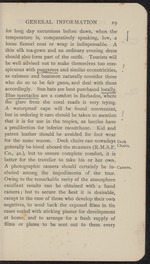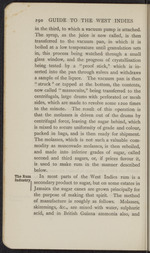| 1 |
 |
“...advised not to make themselves too con- .
spicuous with puggarees and similar eccentricities, '
as cabmen and boatmen naturally consider those
who do so to be fair game, and deal with them
accordingly. Sun hats are best purchased locally.
Blue spectacles are a comfort in Barbados, where
the glare from the coral roads is very trying.
A waterproof cape will be found convenient,
but in ordering it care should be taken to mention
that it is for use in the tropics, as beetles have
a predilection for inferior caoutchouc. Kid and
patent leather should be avoided for foot wear
for the same reason. Deck chairs can nowadays Deck
generally be hired aboard the steamers (R.M.S.P. Chairs>
Co., 4s.), but to ensure complete comfort, it is
better for the traveller to take his or her own.
A photographic camera should certainly be in- Camera,
eluded among the impedimenta of the tour.
Owing to the remarkable rarity of the atmosphere
excellent results can be obtained with a hand
camera; but to secure the best it...”
|
|
| 2 |
 |
“...head of the
harbour of the same name, used to be defended
by Goat Hill Fort on the south, and on the north
by Fort James, while Rat Island, which is con-
nected with Antigua by a narrow isthmus, was
also fortified. The streets are very clean and the
houses are nearly all made of wood painted
a dazzling white. The Anglican Cathedral stands
on rising ground at the head of the town. It
is a handsome stone fabric, with a fagade ter-
minating at either end in octagonal domed towers,
and replaces an inferior building wrecked by
/...”
|
|
| 3 |
 |
“...called “ massecuite,” being transferred to the
centrifugals, large drums with perforated or mesh
sides, which are made to revolve some 1200 times
to the minute. The result of this operation is
that the molasses is driven out of the drums by
centrifugal force, leaving the sugar behind, which
is mixed to secure uniformity of grade and colour,
packed in bags, and is then ready for shipment.
The molasses, which is not such a valuable com-
modity as muscovado molasses, is then reboiled,
and made into inferior grades of sugar, called
second and third sugars, or, if prices favour it,
is used to make rum in the manner described
below.
In most parts of the West Indies rum is a
secondary product to sugar, but on some estates in
Jamaica the sugar canes are grown principally for
the purpose of making that spirit. The method
of manufacture is roughly as follows. Molasses,
skimmings, &c., are mixed with water, sulphuric
acid, and in British Guiana ammonia also, and...”
|
|
